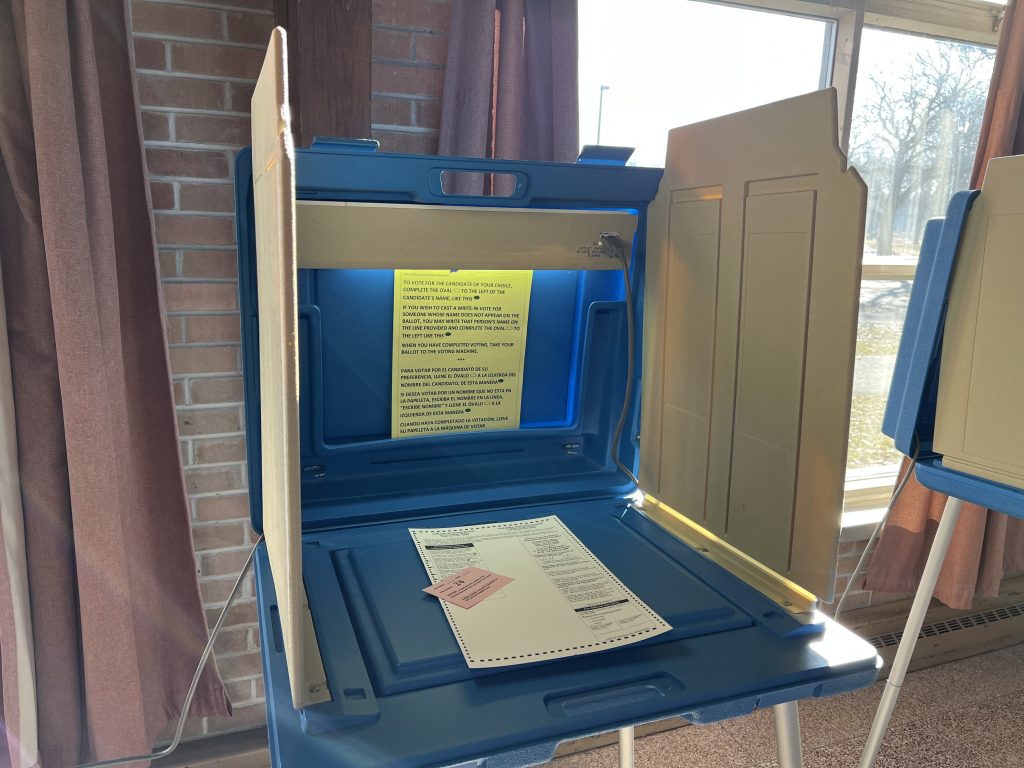$800,000 Non-Partisan Grant Will Improve Milwaukee’s Election Process
But looming constitutional amendment would bar any future awards.
The City of Milwaukee is poised to receive a nearly $800,000 election grant just weeks before a constitutional referendum could ban its acceptance.
The grant would pay for equipment used to process absentee ballots, make polling places more visible, connect with voters via text messages and secure the city’s election operations center. The funding would come from a relatively new nonprofit, Cities Forward.
Election grants became a partisan issue after a Mark Zuckerberg-backed nonprofit provided grants in 2020 to more than 200 cities across the state to purchase dropboxes and help administer the fall 2020 election during the pandemic. On a party-line vote, Republicans placed a constitutional amendment on the April ballot that, if approved, would prohibit any private election donations.
“I think we stood up to scrutiny in 2020,” said Woodall of the outcry over the Center for Technology and Civic Life grants.
Woodall told Urban Milwaukee that the city moved to secure the latest grant when it became clear the state and federal governments wouldn’t provide more aid, nor would the state allow absentee ballot counting to begin the day before an election.
The biggest ticket item the $786,500 grant would cover is two new tabulators, large machines that can rapidly image and process ballots. After manually sorting and recording tens of thousands of absentee ballots, the city uses the tabulators, from Election Systems & Software, to process the batches. Woodall said two new tabulators, at $146,375 each, would be added to the city’s roster of nine tabulators, all of which are earlier models.
At a cost of $37,500, a new text messaging service would allow the city to reach registered voters to correct misinformation or answer questions. “We want to make sure any information anyone in the city is having about voting is accurate and broken down in a way that anyone can understand,” said Woodall. She said even well-intentioned groups can provide inaccurate or hard-to-understand guidance.
“It’s been hard to find a vendor that doesn’t have any political connections,” said Woodall. The commission will use TextMyGov, a Utah-based organization that only has government clients. She said, using the state voter database, the city could message voters in specific wards. The service could also accept incoming messages to answer questions.
The cost to purchase 50 ExpressVote machines is $211,250. The machines are used at early voting sites because they can digitally generate a ballot for any voter in the city and then print a paper copy. But one is also available at each polling place on election day as an accessbility aid, primarily used by seniors who struggle to see or fill in the paper ballot’s circles. The extra machines, said Woodall, would avoid the hurried push to relocate machines from the early voting sites to every polling place.
Additional funding would go toward purchasing 300 A-frame signs, an electric pallet jacket and a table trolley.
The operations center at 1901 S. Kinnickinnic Ave. would receive $60,000 in lighting and security camera upgrades.
Little is known about the latest donor. Cities Forward has a very limited website, which was registered in 2022. Woodall said it is a recognized 501(c)(3) nonprofit and said she believes the organization raises funding from several donors.
A 990 form, which would provide information on funding and expenditures, is not available on Guidestar, a clearinghouse of nonprofit reporting documents. New organizations do not need to file the form immediately. In a statement, the group pledged to file its report “no later than November.”
Based on information available on other websites, the organization is led by Trevor Ostbye, who formerly worked on “pro-voter reform and voting rights” for the Democracy Fund. Ostbye also appears in something called “The Democracy Protection Playbook,” where he is quoted as saying cities are uniquely suited to provide residents with information about elections and voting.
“Along with election departments across the country, Milwaukee is facing serious funding challenges, made worse by the legislature’s shameful inaction on a bill that would have made funding available to all election departments in Wisconsin, including $2.5 million for Milwaukee. Congress also rejected a bipartisan request of election officials and advocates, who sought $400 million in Help America Vote Act (HAVA) grants. Absent adequate state or federal funding for the administration state and federal elections, local governments across the country face election infrastructure shortfalls,” said Cities Forward’s Sam Olier-Friedland in a statement to Urban Milwaukee. “Cities Forward is pleased to support Milwaukee with funding for an urgent election infrastructure request to replace aging tabulators and ADA-compliant voting equipment, especially given that unlike most other states, Milwaukee is not allowed to pre-process ballots, which creates unusually acute operational challenges in needing to process thousands of ballots on election day.
The Common Council’s Judiciary & Legislation Committee is to review the grant on Thursday.
Library Grant
A second grant from the nonprofit would go to the Milwaukee Public Library and be used to explore ways to encourage civic engagement. “It is connecting people to their city services, helping them navigate those programs,” said Woodall. “The library was chosen because it is the most trusted part of city government.”
The grant would support developing new ways of connecting with residents. “At the library, when people are registering for a new library card, they will also be asking ‘do you want us to help us register you to vote today?'” She said a similar strategy would be used by the Milwaukee Health Department at its clinics or other points where the city interacts with residents. The grant will explicitly fund a new website, street outreach team and communications campaign.
The Finance & Personnel Committee is to review that grant award Friday.
The full council is expected to consider both grants when it meets on March 19.
Legislation Link - Urban Milwaukee members see direct links to legislation mentioned in this article. Join today
If you think stories like this are important, become a member of Urban Milwaukee and help support real, independent journalism. Plus you get some cool added benefits.
Related Legislation: File 231756, File 231757

























We keep talking about increasing voter participation for every election. While we all agree that everyone should be able to vote if they want to but is it really good for the country to force less informed people to vote if they dont want to? I mean wouldnt making people who are not informed or dont want to vote actually have negative consequences on our govermental structure?
Ryan – not sure what you mean by forcing less informed people to vote. Seems you dug a hole in your second sentence and kept digging deeper trying to justify it in your third sentence. Have you ever seen a citizen being forced to vote? No
You’re wrong if you equate encouragement or reminders with forcing citizens to vote.
Perahaps you would like more voter restrictions based on being informed?
So what would that “informed voter ” evaluation look like?
I believe the southern states tried to address Ryan’s concerns…something called literacy and citizenship tests.
I have no problem with the grant. What I have a problem with is the stated end goal of having all votes counted by midnight on election night. The end goal should be accuracy, not speed.
The fact that this country’s former president and all of his cronies take issue with the fact that vote counting ends when it ends should not be part of any discussions or decisions as to how long the process takes. His assertion always seemed to be that whatever candidate was winning at midnight on election night was the winner, regardless of how many ballots remained to be counted.
Perhaps a remedial class in Election Night for Dummys is needed for those that can’t quite understand the process.
Ryan, your statement is racist, classist, and ableist. Your objection is directed at the poor who are overwhelmingly POC as well as people who struggle to vote because of barriers. What’s more you assume those who struggle to vote are less informed. Actually, the poor and disabled are more aware of how government impacts their lives and less swayed by the plethora of disinformation AND misinformation coming from some campaigns.
Finally voting is not a right. It is a responsibility of all citizens. And yes, you are right, with greater participation of marginalized people would make our government structures less racism and classist as well as more in line with the ADA. All this would result in government by, for, and of all the people.